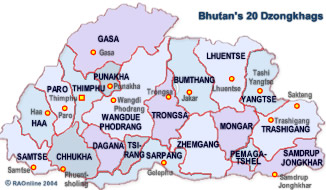 |
Bhutan Development |
|
|
 |
|
Providing
electricity to villages
|
 |
Come
December and about 6,300 households in 15 dzongkhags around the country
should have electricity in their homes. That is the target set by the Bhutan
power corporation (BPC) under the second phase of the rural electrification
project financed by the Asian Development Bank (ADB).
Electric
poles and hundreds of kilometres of transmission lines are running through
numerous villages in the 15 dzongkhags ready to brighten the lives of people
in rural Bhutan. |
| 6,300
rural households to be lit by December 2002 |
About
738 households in Thimphu, 473 in Punakha and 422 in Wangduephodrang as targeted are eagerly waiting for power supply from the source to be
switched on which is expected to happen in November according to BPC officials.
In Paro,
171 households of the targeted 294 already have lights while the remaining
households will be illuminated by December.
In
central Bhutan about 70 percent of the transmission line work to light
eight villages in Bumthang have been completed according to the Bumthang
BPC deputy manager of electricity supply division (ESD), Namgay .
The
target is to light up 98 households in Bumthang and another 14 households in
Trongsa. The target number in Trongsa has been increased to 339 households
in seven villages. Nubi geog which does not have even one village electrified
has a proposal to electrify about 61 households in Willing and Bjee villages.
Another 215 households in Drakten geog and 63 in Tangsibji geog is to be
electrified by December.
Trashigang dzongkhag
in the east which has the most extensive rural electrification network,
has a target of about a 1000 households in the second phase. Eleven of
the dzongkhags 16 geogs were electrified in the first phase of the project.
The rural electrification network is almost complete for about 32 households
under Khaling, 103 in Moshi, 387 in Phongmey and 319 in Udzorong geogs.
Private contractors are carrying out the work to supply power to about
119 households under Thrimshing dungkhag and 117 households in Brekha.
While
some 197 households under Tetsho geog, Trashiyangtse are ready to
receive electricity infrastructure work in Khemdang geog is in full swing
while work on connecting 114 households in Yangtse is yet to begin. Trashiyangtse
dzongkhag will receive power from the 2.2-megawatt powerhouse in Rangjung.
In the Ninth Five Year plan the dzongkhag has targeted to light up over
800 households.
Construction
of transmission lines in six villages in Mongar have been completed
and about 260 households in the six villages of Depung, Hurung Pang, Konber,
Thimnangbi, Thidangbi and Jangdung are fixing their internal house wiring
to receive power from the 132 kV substation in Khilikhar by December. BPC
officials in Mongar are confident that about 300 households in Nagtsang
and Chaskar geogs will be ready to receive power within this month. About
13 villages in five geogs in Mongar were electrified in the first phase
of the ADB project.
Meanwhile,
only about 10 percent of the works had been completed of the targeted 828
households in Pemagatshel. Electrification works in the three geogs
of Tsebar, Urung and Khar are contracted out and are in full swing, according
to a BPC official in Pemagatshel. So far only a portion of Zobel geog has
been covered. Although Pemagatshel has the Nangkhor substation carrying
power from Kurichu, only the town and the Nangkhor area has electricity
as of now.
In
the south, over 60 percent of electrification works for about 300 households
in Sarpang has been completed about 134 households in Goshi geog
in Dagana dzongkhag are ready to receive power.
In Samtse 70 percent of the work to light up seven villages has been completed. From
the targeted 255 households, power was also released to about 70 households
in Tendu.
| This
article was contributed by KUENSEL, Bhutan's National Newspaper, 2004 |
 |
| more
information |
 |
|

